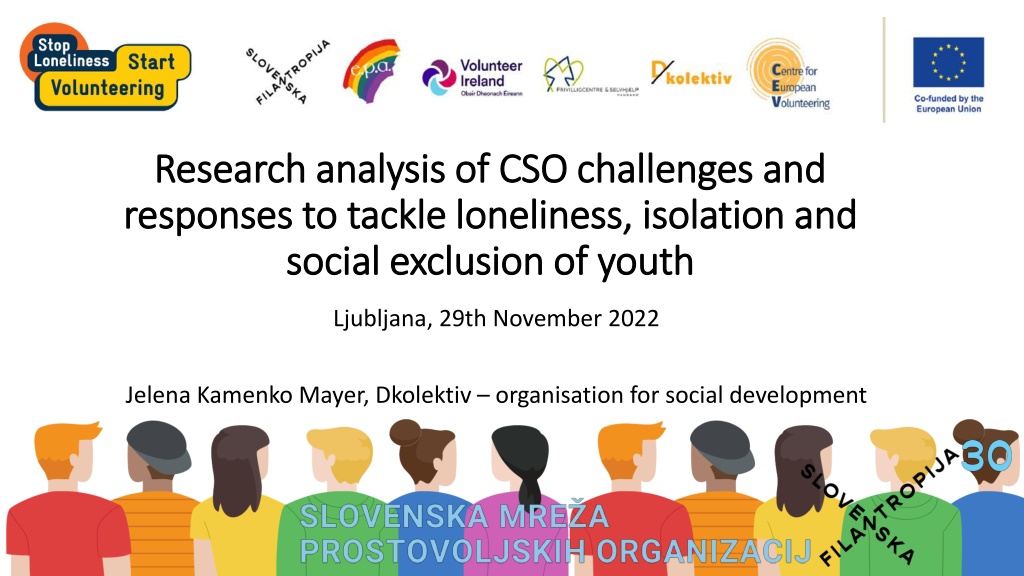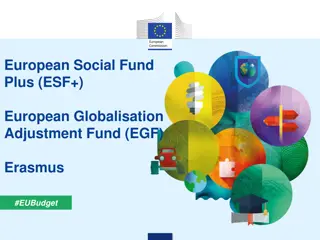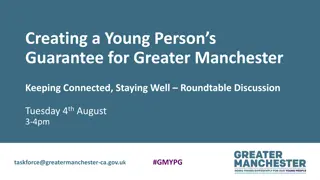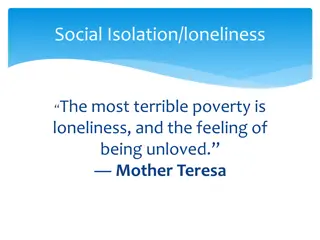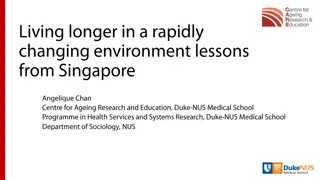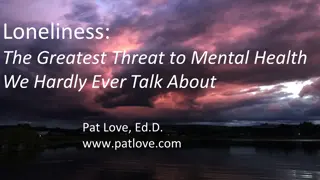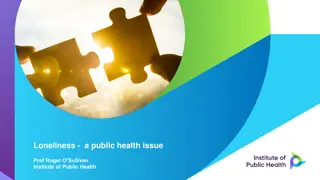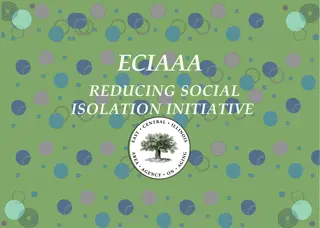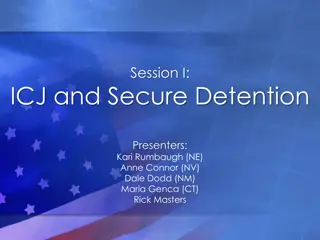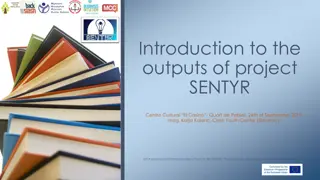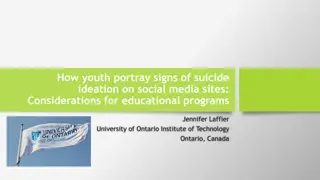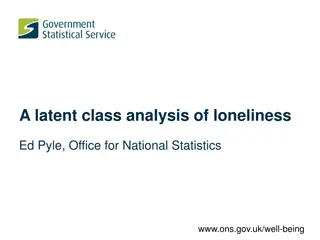CSO Challenges and Responses to Tackle Loneliness and Social Exclusion of Youth
Explore research analysis on CSO challenges and responses in addressing youth loneliness, isolation, and social exclusion. Presented by Jelena Kamenko Mayer from Dkolektiv organization. Event to be held in Ljubljana on 29th November 2022.
Download Presentation

Please find below an Image/Link to download the presentation.
The content on the website is provided AS IS for your information and personal use only. It may not be sold, licensed, or shared on other websites without obtaining consent from the author. Download presentation by click this link. If you encounter any issues during the download, it is possible that the publisher has removed the file from their server.
E N D
Presentation Transcript
Research analysis of CSO challenges and Research analysis of CSO challenges and responses to tackle loneliness, isolation and responses to tackle loneliness, isolation and social exclusion of youth social exclusion of youth Ljubljana, 29th November 2022 Jelena Kamenko Mayer, Dkolektiv organisation for social development
About research This research was implemented in order to explore: to what extent do existing EU and national policies and practices in partner countries grasp the process of volunteering, support it and see it as a possible solution in the fight against loneliness, isolation, and exclusion of young people the role of volunteers and civil society organisations seek out relevant statistics to measure the level of loneliness, and isolation among young people. Methodology used: desk research in all partners countries combined with the questionnaire for civil society organisations working with or involving youth as volunteers (231 questionnaires collected)
Loneliness in Europe Young people (18-25 year olds) were most affected by COVID19 in terms of feelings of loneliness. The proportion of young people who frequently felt lonely quadrupled in the first few months of the pandemic. As a result of this spike, young people were the loneliest age group, with 35% frequently feeling lonely In 2016 12% of EU citizens felt lonely more than half the time. This figure increased by over double to 25% in the first few months of the COVID19 Pandemic. The increase in feelings of loneliness was felt evenly (geographically speaking) across the Union, with all member states having loneliness levels of between 22%- 26%. Joint Research Centre, Loneliness in the EU Insights From Surveys and Online Media Data , p.7,
Desk research policies tackling loneliness and isolation Despite the various research conducted in all countries and at the EU level, none of the countries involved in the project does not have yet specific national strategy or plan to combat loneliness (mostly represented in plans/programmes combating social exclusion or dealing with mental health issues). Denmark has a recommendation from 2021 to adopt the National strategy to combat loneliness.
Number of organisations that conduct volunteer programme or activities to support and actively involve people facing loneliness, exclusion or isolation support groups, Facebook groups awareness raising through public dialogues, social events... creative work (arts, crafts, knitting, etc.) social activities (walks, board games, card games, shared dinning) helplines and individual support workshops and education geared towards personal empowerment social cafes, social centres and social gatherings youth centres and youth network big brother, big sister friendship programmes, B-Friending programmes music groups and music events outdoor sports activities With developed programmes 43% Without programmes 42% Without programmes, but considering it With developed programmes Without programmes, but considering it Without programmes Over 41% of organisations stated that they do involve youth affected by loneliness and isolation as volunteers, but also 40% of the organisations did not know or were not aware if their volunteers were people affected by loneliness and inclusion.
The effects or the value recognised for the young volunteers The effects or the value recognised for the young volunteers that have been dealing with loneliness and isolation that have been dealing with loneliness and isolation You get more back than you give Volunteering had positive effects on their mental health or overall personal well- being (on average over 72%) Volunteering was a good way to connect with others and helped expand their social network (on average over 72%) Volunteering helped to build self-esteem and self-confidence (over 67%) Volunteering helped them overcome the feelings of loneliness and isolation (over 65%) Volunteer, Denmark I feel good in your organization, I feel wanted and useful Volunteer, Slovenia Here is better than at home, I feel comfortable Volunteer, Germany Being with like-minded people make me feel safe, included and accepted Volunteer, Ireland You are never alone Volunteer, Ireland "When I volunteer at the Association, I don't think about nonsense Volunteer, Croatia
Enabling environmet Legal framework Public policy Social atmosphere 100 50 50 50 0 1 Poor 0 1 Poor 0 1 Poor Series1 Series1 2 Fair 2 Fair Series1 3 Good 2 Fair 3 Good 4 Very good 4 Very good 3 Good 5 5 4 Very good 5 Excellent Excellent Excellent The results across the partner countries differ. In those countries that have some kind of public policies in practice stated that the legal frameworks or public policies are good in average (Slovenia, Germany, Ireland), as well as social atmosphere. The existing good practice and culture of volunteering were better rated on average in all partner countries - the role of civil society and its interventions in combating loneliness, isolation and social exclusion. Existing good practice Culture of volunteering 50 50 0 1 Poor 0 1 Poor Series1 2 Fair 3 Good Series1 2 Fair 4 Very good 3 Good 5 4 Very good 5 Excellent Excellent
Potential support providers RECOGNISED CHALLENGES (CSOs that involved volunteers) Volunteers affected by loneliness and isolation need more personal support (over 60%) Additional knowledge and comprehensive understanding of the effects of loneliness and isolation is required to work with them as volunteers (over 47%) Coordinating volunteers affected by loneliness and isolation is more complicated due to the longer time period required for volunteers to feel confident and secure in their role (over 35%) Coordinating volunteers affected by loneliness and isolation takes more time (over 31%) A lot of effort needs to be invested in motivating volunteers affected by loneliness and isolation (over 31%) Other organisations (municipalities, national frameworks, local volunteers and community groups, university, etc.) 6% Organisations with a specific focus on loneliness and isolation, mental health issues, etc. 31% Another volunteer involving organisation 16% Youth organisations 23% National/local volunteer centres or networks 24% SUPPORT NEEDED Over 56% of organisations recognise the value and power of examples of good practice and exchange of information with other volunteer managers/organisations/networks Over 49% of questioned organisations stated that they lack knowledge and competences about finding and recruiting young people affected by loneliness and isolation. Over 48% of organisations stated that they lack knowledge and competences about adapting or implementing new activities for youth affected by loneliness and isolation. Over 45% of organisations recognised the need for the support from local/regional/national government in the area in which their organisation operates. MAIN OBSTACLES RECOGNISED We do not have enough resources (human, financial) to adapt the activities and volunteer programme to involve loneliness and isolation (over 51%) Insufficient organisationalcapacity (over 41%) We do not have sufficient knowledge and competences to work with youth affected by loneliness and isolation (over 29%) youth affected by
The role of civil society Other (involve young people as volunteers, giving youth a hope, etc.) Advocating for the development of an enabling environment that supports volunteer programmes that involve youth Providing knowledge on the topics of youth loneliness and isolation through education and trainings Raising awareness through campaigns that reduce stigmatization of young people facing loneliness and isolation Providing prevention programmes Creating and supporting a sense of community Providing meaningful and inclusive engagement to youth affected by loneliness and isolation Sustained reciprocal cooperation with other sectors (e.g. referring youth that need professional help to health Providing support (counselling, advising, support groups) in combating youth loneliness and isolation 0 20 40 60 80 100 120 140
RECOMMENDATIONS ADVOCATING FOR MORE ENABLING ENVIRONMENT TO COMBAT LONELINESS, ISOLATION AND SOCIAL EXCLUSION NETWORKING AND PARTNERSHIP ON LOCAL/NATIONAL/EUROPEAN LEVEL STRENGHTENING CAPACITIES OF CIVIL SOCIETY ORGANISATIONS RAISING PUBLIC AWARENES
THANK YOU! QUESTIONS?
